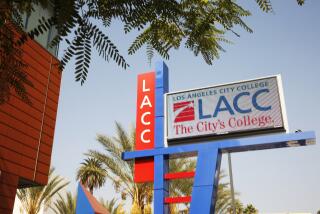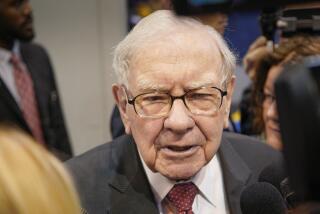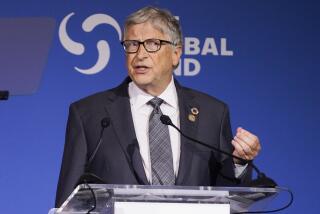Scholarship Donor Keeps Cultivating His Nebraska Roots
- Share via
It all started with a serious question from Groucho Marx.
It was 1956, and Col. Barney Oldfield had just won $1,050 on the television game show “You Bet Your Life” when Marx, the show’s host, asked how he planned to spend his winnings.
“I’m standing there in an Air Force uniform in front of 35 million people--I can’t say, ‘I’m going to put it in my pocket and run for the hills,’ ” he said.
So he blurted out that he would donate the cash to the University of Nebraska Foundation to establish a scholarship at his alma mater.
He later discovered, however, that the scholarship fund needed $23,000 to be sustained, so he kept contributing money he received for speeches and appearances on game shows like “To Tell the Truth,” “Strike It Rich” and “Password.”
From that modest starting point, Oldfield and his late wife, Vada, have given to or established some 40 scholarship funds and programs through the foundation. Their benevolence is valued at more than $3 million.
“About half are operational--the other half are waiting for me to die,” said Oldfield, 90, who lives in Beverly Hills.
They’ve also given hundreds of thousands of dollars to other educational causes. Some of the gifts have strings attached. One provides aid to students who recognize the gross misuse of the meaningless phrase “you know” in radio or television broadcasts. Another rewards students who stay in Nebraska for college.
Oldfield never forgot his Nebraska ties, even as he worked as an aide to Gen. Dwight D. Eisenhower in World War II and as a press agent to Hollywood stars like Elizabeth Taylor.
“Here’s a small-town boy of pretty humble roots . . . who had lots of people help him along the way, and now he feels it’s time for him to give back,” said Doug Christensen, Nebraska’s education commissioner. “That’s a story that everybody needs to hear.”
Born in Tecumseh in 1909, Oldfield was named after the race-car driver who became the first to travel a mile in a minute.
His father was the house detective at the Cornhusker Hotel in Lincoln, Neb. His mother ran a college boardinghouse.
He earned a bachelor’s degree from the University of Nebraska, where he met Vada, then worked as a newspaper reporter in Lincoln and as Variety magazine’s first Nebraska correspondent in 1930.
World War II sent Barney, then a U.S. Army reservist, to parachute school at Ft. Benning, Ga., and then to England, to recruit other journalists willing to accompany American paratroopers on the Normandy invasion.
“I was supposed to talk guys who made their living with their imagination into taking parachute training,” Oldfield said. “I emptied more pubs just by walking in the door than you could shake a stick at.”
On D-day, Oldfield was assigned to write Allied communiques about the invasion from England, and he joined the 12th Army Group in France a month later.
Vada Oldfield enlisted in the Women’s Army Auxiliary Corps, later the Women’s Army Corps, and served in Africa, Sicily and Italy as a Teletype operator.
After the war, Barney Oldfield’s career as a publicist took him in many directions.
He worked in Hollywood for Warner Bros., acting as press agent for stars like Errol Flynn, Elizabeth Taylor and Ronald Reagan.
Later, after return stints in the military, he traveled the world as a publicist for Litton Industries, a shipbuilding company.
The Oldfields traveled to more than 80 countries.
“By not having any kids or dogs, I could call Vada and say, ‘Pack your bags. We’re going to Uganda in the morning,’ ” he said. “And the next day we’d slam the door.”
But they never closed the door on Nebraska.
The first scholarship in the Oldfields’ name was given in 1967 to a University of Nebraska student named Tony Kozlik, who could not afford a room in Lincoln and commuted the 47 miles each day.
“It certainly helped me get through college,” said Kozlik, now an engineering manager in Phoenix. “I was doing it on my own--I didn’t have any help from my parents.”
The Oldfields endowed scholarships in the hometowns of the 22 Nebraskans entombed in the Arizona, which sank during the Japanese attack on Pearl Harbor in 1941.
A stickler for grammar, Oldfield helps sponsor the Nebraskaland Foundation’s annual “You Know” contest to raise awareness about the meaningless phrase that infests everyday speech. The contest awards $1,000 to the Nebraska student who counts the most “you knows” during one radio or television program.
Earlier this year, Oldfield donated $500,000 to start a statewide Dollars for Scholars program that will help communities form local chapters to raise money for local scholarships.
Oldfield last year pledged $1,000 to each of Johnson County’s 58 kindergartners who graduate from high school, and a second $1,000 if they go to college in Nebraska.
He also gave $1,000 to each of the county’s 86 high school graduates in the Class of 2000 to use for whatever purpose they chose.
“I get letters from the kids all the time saying what a difference it made,” Oldfield said, describing them as surrogate children. “I think by now we’ve probably interfered with the lives of about 800 young people constructively with these scholarships.”
After his wife died last year following an 11-year struggle with Alzheimer’s disease, Oldfield gave $20,000 to establish the Vada Kinman Oldfield Alzheimer’s Research Fund at the University of Nebraska Medical Center.
He has pledged to provide $20,000 annually to the fund, but he is also getting help from others.
Former world heavyweight champion George Foreman, who met the Oldfields when he was a young boxer in Los Angeles, recently donated $100,000, describing Vada Oldfield as “one of my favorite ladies in this entire world.”
When asked how he’d like to be remembered, Oldfield paused, then smiled. “I’d like people to say, ‘He gave as much as he got,’ ” he said. “And I got a lot.”
More to Read
Sign up for Essential California
The most important California stories and recommendations in your inbox every morning.
You may occasionally receive promotional content from the Los Angeles Times.










